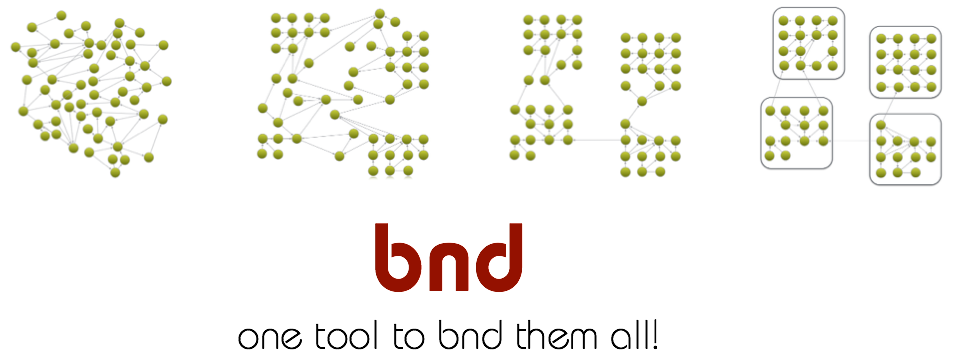Bnd/Bndtools is a swiss army knife for OSGi. It creates manifest headers for you based on analyzing the class code, it verifies your settings, it manages project dependencies, diffs jars, and much more. At the core is a library with all the functions. The library is then used in a myriad of subsystems to provide the core functionality to the rest of the world.
- bndlib and friends – The core library plus repository, resolve, etc.
- maven plugins – A full set of maven plugins that make bnd useful for maven users
- eclipse – Bndtools is the plugin for Eclipse that provides full GUI support for bnd. This is a p2 repository.
- bnd – a command line utility with a hodgepodge of sometimes extremely useful functions. Can even be used instead of a build tool. is available through Homebrew formula.
- gradle plugin(s) – A bnd workspace plugin that builds identical to Eclipse's bndtool as well as a gradle plugin that provides bnd support for non-workspace projects
- ant – well ...
Well, assuming you were born after 1970 you probably know how to file an issue? :-) We got a good record fixing bugs. However, to help us, it always works best if you can provide the smallest possible example as a github repo. If the bug is consistent we tend fix it really fast. At least specify the environment where the bug appears, we got lots of variants.
General feedback is of course also always welcome! The bnd discourse site mail list is open for any topic even remotely associated with bnd. And we even love to hear also how people use the product that takes so much of our time.
And the ones we love most are of course PRs! The documentation of bnd is fully included in this workspace. From a typo to a brilliant essay on Launchpad, submit a PR and we probably take it. Don't ask what bnd can do for you, ask what you can do for bnd!
This program and the accompanying materials are made available under the terms of the Apache License, Version 2.0 which is available at https://www.apache.org/licenses/LICENSE-2.0, or the Eclipse Public License 2.0 which is available at https://www.eclipse.org/legal/epl-2.0.
We go out of our way to be backward compatible. There are thousands of extensive test cases and we use our own baselining tool to verify that we do not make gratuitious changes. Since this tool is part of Bndtools we often find out early enough that there are alternatives to breaking changes. We strictly follow OSGi semantic versioning. This means that we mark exported packages with a package version.
We try to keep major versions to a minimum but sometimes we must. This is clearly marked with a major release number.
The master branch is release 7 currently and the Java release version is 17. Since some libraries are used in the embedded world that have a slower uptake of the Java release train we keep a classic branch that continues a major release 6 on Java 1.8. The classic branch does not include the plugins.
Want to work on Bnd/Bndtools? There are instructions to get you started. Please let us know if anything feels wrong or incomplete.
Some more instructions how to get started with bndtools development can be found here
We have the following branches:
master– Where the work for the next release takes place. Pushes on this branch release to the snapshot repositoryclassic– A continuation of 6.4 compiled on Java 1.8 for the poor developers stuck in the limbo of 1.8 and 17.next– Release branch to Maven central. Is used during the release process.
We generally do not use other branches. Issues and features are handled through PR's from forked repos.
Open issues are the one actively scheduled to go into the next milestone(s).
All other issues will be closed. However, some issues we close because we just lack people that are interested in working on them. We explicitly mark those issues with abeyance. If you got time to spare, do not hesitate to open them and indicate you're willing to work on them. We will then properly schedule and track them. If you need to find them, use this filter: is:issue label:abeyance, make sure is:open is not in the filter.
We try to have a release every 3-6 months and plan these with milestones.
PRs should be submitted via another repo. After approval, they will be built to check for our requirements.
Actions trigger workflows depending on the branch. PR's for verification require approval when not from a known contributor. We verify the code quality with CodeQL and the contribution rules are also checked.
All our artifacts are in the biz.aQute.bnd group id.
- Stable releases – https://repo.maven.apache.org/maven2
- Release candidates – https://bndtools.jfrog.io/bndtools/libs-release/
- Snapshots – https://bndtools.jfrog.io/bndtools/libs-snapshot/
Bnd Gradle Plugins are finally released to the Gradle default repository as well. Bnd Maven Plugins are stored in the listed repos.
Bndtools requires a p2 repository and is therefore special:
- Latest stable release – https://bndtools.jfrog.io/bndtools/update-latest
- Latest release candidate – https://bndtools.jfrog.io/bndtools/update-rc
- Latest build snapshot – https://bndtools.jfrog.io/bndtools/update-snapshot
We use Gradle and Maven to build and the repo includes gradlew and mvnw at the necessary versions.
We require at least Java 17.
./gradlew :build- Assembles and tests the Bnd Workspace projects. This must be run before building the Bnd Maven and Gradle plugins../gradlew :gradle-plugins:build- Assembles and tests the Bnd Gradle plugins../mvnw install- Assembles and tests the Bnd Maven plugins../gradlew :publish- Assembles and publishes the Bnd Workspace projects intodist/bundles../gradlew :gradle-plugins:publish- Assembles and publishes the Bnd Gradle plugins intodist/bundles../mvnw -Pdist deploy- Assembles and publishes the Bnd Maven plugins intodist/bundles.
YourKit supports open source projects with its full-featured Java Profiler. YourKit, LLC is the creator of YourKit Java Profiler and YourKit .NET Profiler, innovative and intelligent tools for profiling Java and .NET applications.
icons8 – For some of the icons





